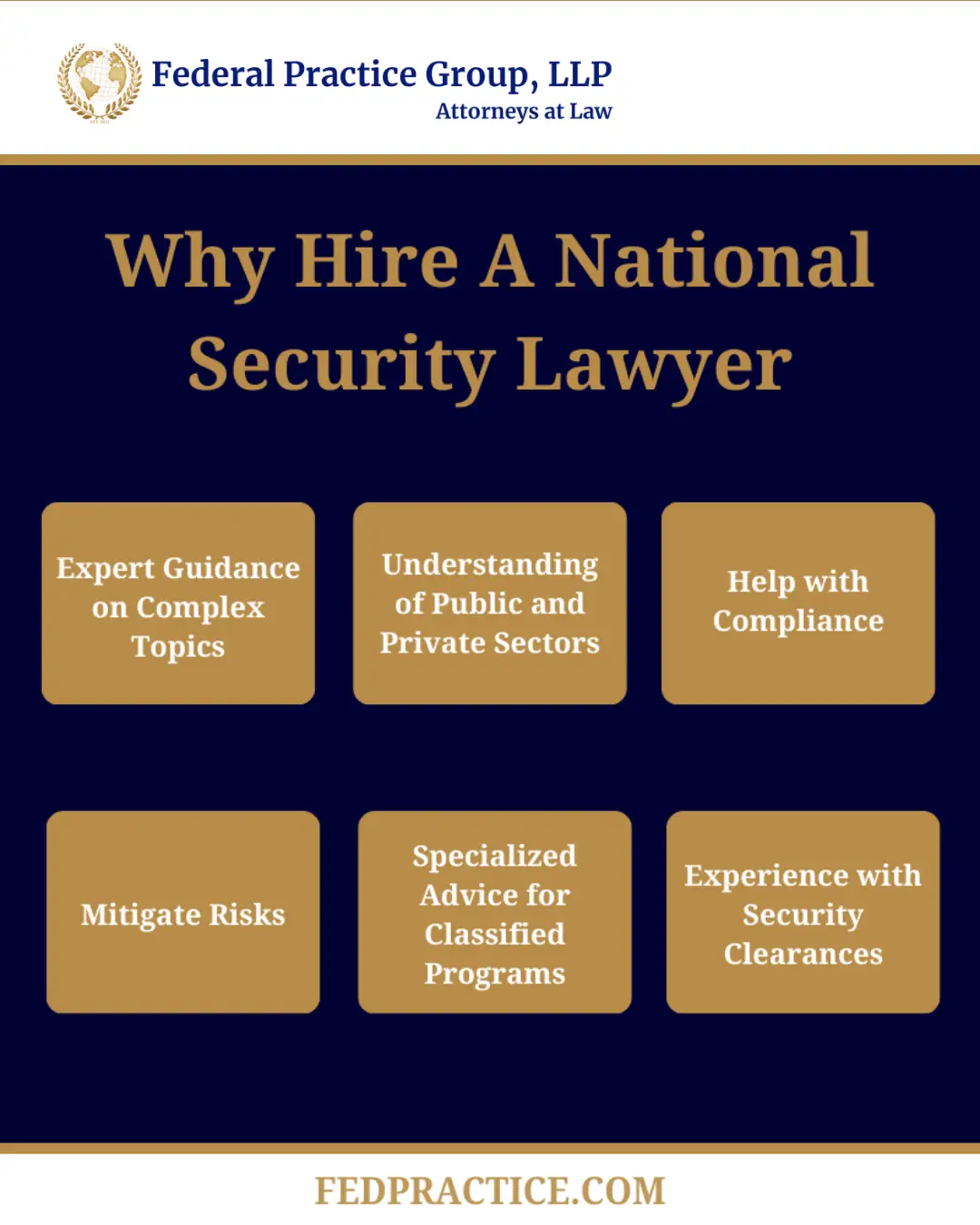Virginia National Security Lawyer

An Overview Of National Security Cases
As our national security lawyer can tell you, any case involving the U.S. government comes with an array of challenges. Clients who are facing a legal issue can benefit from having a highly skilled and specially experienced legal team to assist them with their case. When you are confronted with a legal problem by one of the most powerful governments in the world, you need nothing less than a skilled legal team who understands the system inside and out.
Whether you are facing federal charges or have experienced workplace retaliation from a government entity, you can depend on the Federal Practice Group to provide you with the valuable support you need to make sure that you have the strongest possible case.
We represent clients who face serious legal issues such as whistleblower cases, employer retaliation, criminal charges, government contracts, and much more. Cases involving the federal government are highly complex and involve multiple parties and elements. If you are seeking accessible and cost-effective legal counsel and representation, reach out to our office and schedule a confidential appointment today.
Table of Contents
Types Of Cases Our Attorney Handles
As an internationally distinguished legal team, the attorneys at Federal Practice Group have years of experience and sharpened skills to work on some of the most complex cases involving the federal government. There are many issues that could prompt you to obtain the help of a DC National Security Attorney, from government contract disputes to security clearance matters.
When your rights as a federal employee are being threatened, you can rely on excellent legal counsel from our team to help you with your unique case. Some specific legal areas that our skilled law firm has experience with include:
How Our National Security Lawyer Can Help You
When you are dealing with a case that concerns national security, you need to make sure you hire an employment litigation lawyer who understands that particular area. Having a lawyer at your side to help you navigate complex legal matters that deal with the federal government can provide you with many advantages. You are working with a lawyer who is highly familiar with a unique practice area that few attorneys have experience working in. They have a strong understanding of federal laws and understand what legal strategies should be best utilized for achieving optimal case results.
Security Clearance Investigations
The federal government necessitates that its employees and contractors get security clearances so they can perform their job duties. The process of obtaining security clearance is a complicated one, which commonly requires in-depth investigation into the person’s background. For the government to get a better picture of that person’s character, the one pursuing security clearance may have their personal life and financial history thoroughly reviewed.
There is no guarantee that an employee will possess clearance indefinitely. The steps that go into granting someone security clearance is comprehensive. The government can revoke or suspend a workers clearance if their well-being or ethics seem to have been compromised in some way. If you are at risk of losing security clearance, or have recently had it withdrawn, it is imperative that you speak with a lawyer who is experienced in this area of law. You are entitled to fair due process before they can revoke your security clearance, and with our representation you have someone to advocate for you during the appeals process. Our team can handle such matters:
- Federal Contractor Security Clearance
- Military Security Clearance
- Security Clearance Appeals, Revocations, and Denials
- Hearing Representation
- DOD and Federal Agency Clearance
When looking to advance your career or seize an opportunity, getting the required security clearances is critical to your success. You must contact a seasoned attorney to help with properly documenting your history. We can see to it that you obtain the clearance you need. We have vast experience counseling companies and clients as they go through the process of security clearance, and can handle tasks such as:
- Counseling for preclearance of DOD form 1879 and SF-86
- Preparing for polygraph examinations and other security clearance interviews
- Requesting hearings or post-denial hearings
- Drafting a response for the Statement of Reasons and Denial Letters
Security Clearance Revocations
Following a security clearance revocation, a number of issues may occur. The most major consequences following a security clearance revocation or if the minimum clearance level changes are losing your position or even your governmental career. While in the case of the clearance level changing you’re probably not at fault, but for a security clearance revocation, the typical reasons include foreign influence and security violations. The Adjudication Guidelines list 13 covers a wide spectrum of possible offenses that can call into question one’s allegiance or integrity towards the United States. Issues such as drug offenses or financial hardships can even be grounds for revocation as you might be more likely to sell out your country. Sex scandals can be an issue too as they may make you more susceptible to being blackmailed.
Unfortunately, sometimes revocation can also happen as a result of discrimination–such as due to race or religion or even retaliation from management. Whether you’re facing charges, personal affairs, or even discrimination that’s putting your security clearance in jeopardy, having an attorney by your side will ensure that revocation can be overturned.
What Can Happen Following a Security Clearance Revocation
Essentially, the appeals process will determine whether your alleged missteps make it truly doubtful that you are trustworthy, willing, and able to continue safeguarding classified information as you move forward in your career. If your misstep was innocent or relatively innocent, it is possible that representation from a knowledgeable DC national security attorney with the Federal Practice Group can lead to a successful defense of your claim.
When our experienced legal team at the Federal Practice Group begins constructing your appeals defense, we will seek to determine whether any mitigating factors may play a role in your case. Certainly, if misinformation has contributed to the allegations against you, we will bring that to light. Additionally, our DC national security attorney team will question the recency of the alleged conduct, whether you voluntarily provided the information that led to the revocation, whether you have made good faith efforts—in a prompt manner—to correct false information or otherwise set a questionable situation right, and whether any negative information in question was either unsubstantiated or wasn’t pertinent to a determination of your trustworthiness and reliability.
Appealing A Security Clearance Revocation
If you have had your security clearance revoked, you are not alone. Many federal employees have experienced a revocation in their security clearance status at one time or another. It is important to treat this revocation seriously, as failure to appeal the revocation successfully may limit your career advancement and/or cost you your job. The DC national security attorney team at Federal Practice Group can assess the unique circumstances of your situation in order to best determine how to move forward.
Obviously, there are some reasons for security clearance revocation that are more serious—and therefore, more likely to “stick”—than others. Security violations that concern the unauthorized disclosure of classified information generally lead to a legitimate revocation of security clearance status. With that said, there are cases in which a federal employee made a technical, slightly careless, or even negligent misstep that led to a security violation revocation that could potentially be appealed successfully.
Similarly, personal conduct and/or issues concerning drugs may lead to security clearance revocation. Generally speaking, unacceptable personal conduct for an individual with security clearance is defined as follows, “conduct involving questionable judgment, untrustworthiness, unreliability, lack of candor, dishonesty, or unwillingness to comply with rules and regulations could indicate that the person may not properly safeguard classified information.”
Examples of such conduct are numerous and include a failure to cooperate with required testing, security processing, or proper completion of security forms. Intentionally providing incomplete or false information to the government or a government contractor is also a common reason for security clearance revocation because it calls into question the trustworthiness of the employees who are making questionable choices. Finally, a pattern of rule breaking or conduct that may render you more vulnerable to coercion or exploitation can lead to a security clearance revocation.
Reasons For Security Level Changes
Usually, a security level change is the result of a job change or promotion, but a security level change can happen under any federal job. Your position might undergo a higher clearance level. One example could be if the job moves outside certain contracts that need higher levels of scrutiny. In such situations, an employee is generally given a grace period where they can complete the higher security clearance when needed. In such a situation, you should be given plenty of time and instructions to complete your new security clearance to either retain your current job or to fulfill your new role.
However, sometimes employees’ clearance is abruptly revoked without notice and this can often be the result of discrimination. Anything from race, religion, pregnancy, whistleblowing, filing a work injury claim or sexual harassment suit, etc. Another reason could be that management is simply wanting to terminate employees. No matter the reason if your security clearance level changes and you’re not given the opportunity to undergo the necessary steps to adjust, you can rightfully assume ulterior motives.
3 Types Of Immigration Cases For A National Security Attorney
When it comes to immigration law, there are several differences in the cases you might face. You may need a lawyer to help you get to the U.S., or you may need to defend your case to stay. Our national security attorney can help with many types of immigration cases. We have experience in the following immigration law areas and more.
ASYLUM
In the US, there are very specific criteria to qualify for asylum. You have to have refugee status and be currently living in the country. You must also prove you have a “well-founded fear” of harm or persecution to be granted asylum and stay in the US. For example, if your religion is targeted and violently discriminated against in your home country, then your fear of harm upon returning could be well-founded. Other protected statuses recognized by the U.S. include:
-
- Race
-
- Nationality
-
- Religion
-
- Particular Social Group (or “PSG”)
-
- Political Opinion
The application through the United States Citizen and Immigration Services (USCI) requires a lot of documentation, so hiring an attorney can help you prepare and present your case.
DACA
DACA, or Deferred Action for Childhood Arrivals, is the program that allows undocumented immigrants who were brought to the U.S. as children to defer deportation and work in the country. With this type of case, an applicant will need extensive documentation showing when they came to the US, what they have been doing since, and any legal trouble they may have been in. DACA applications are complex, and our attorney can be helpful in organizing documentation or helping you appeal a denial.
VISAS
You may need assistance getting a visa. There are several types of visas you could apply for, and our national security attorney can help you through the system. Your purpose in the U.S. and country of origin will determine which visa to apply for.
One common visa is the student visa or F-1. Almost every category also has a corresponding visa for the spouses and children of the applicant. Another common classification of visas is H visas. They are for temporary employees or trainees, including nurses and agricultural workers. No matter the visa or immigration issue, a national security attorney can help you get to the U.S.
National Security Lawyer Infographic

National Security Statistics
According to the National Background Investigations Bureau, just under 10 percent of applicants are denied by the National Security Agency. The CIA rejects approximately 7 percent of applicants and the National Reconnaissance Office also rejects about 7 percent. While that number may seem low, if you are one of those rejected, then call our law firm for assistance.
Contact Our National Security Lawyer Today
You can’t just rely on any attorney to handle your case and build a strong defense for you. Seek the legal assistance of a trusted attorney who has extensive experience assisting clients who have cases that deal with the federal government. You should not wait another day to explore your full legal options. Schedule a risk-free and confidential legal consultation with a top National Security Attorney from the Federal Practice Group to receive the urgent help that you need.

National Security FAQs
What Kinds Of Legal Matters Do National Security Attorneys Address?
Our national security lawyers may assist clients in a wide range of issues relating to intelligence, national security, and national defense. We can help you with security clearances, including the application process and what to do if your application is denied. We also deal with counterterrorism issues, making sure that your rights are protected under the USA PATRIOT Act and the Foreign Intelligence Surveillance Act (FISA).
We can also help you if you’ve run into legal trouble on suspicion of espionage, supporting terrorist organizations, or violating export control laws. We can also defend your privacy rights and protect you if you have been accused of wrongdoing.
How Does The USA PATRIOT Act Impact Individuals And Businesses?
The PATRIOT Act enhanced the scope of federal surveillance and law enforcement powers in matters of national security. This Act, while it was intended to protect our country, may also place individuals and businesses under undue scrutiny or raise questions of privacy concerns. For example, in some cases, the government may access records or monitor communications without a warrant.
We help protect the civil liberties of individuals who are unjustly targeted by the PATRIOT Act and businesses whose operations are impeded by excessive governmental monitoring or interference. For example, you could face liability if your company fails to comply with PATRIOT Act regulations, even if it’s unintentional. We help present a case on your behalf to defend you from legal consequences under this act.
What Steps Should I Take If A Government Investigator Reaches Out To Me?
If you’re contacted by a government investigator, remember that you have rights, including the right to be represented by an attorney during questioning. Between the time the investigator contacts you and you’re able to contact a lawyer, though, it’s important to be as polite, calm, and respectful as possible. Ask for the investigator’s name and agency and for clarification about the nature of their inquiry.
Avidly providing information without speaking to a lawyer first. You may politely inform the investigator that you would like to speak with an attorney first to ensure that your rights and interests are protected during the investigation.
Is It Possible To Contest A National Security-Related Detention?
Yes, you may contest a national security-related detention. If you believe you have been unlawfully detained, then you have the right to challenge the detention through the appropriate legal avenues. A good way to start is contacting a D.C. national security attorney to help you navigate the often-confusing legal channels that can lead to your freedom. Your lawyer may file a habeas corpus petition, which demands that the circumstances of your detention be reviewed to determine their legality. We can gather evidence and present the argument on your behalf as we understand what laws are available to challenge your detention.
What Are My Rights Concerning Classified Information?
Your rights regarding classified information revolve around access and protection, usually as it pertains to your job. For example, if your job regards questions of national security, and you have a security clearance, then you may access the materials necessary to complete your job tasks, but you must follow the appropriate guidelines for handling them. You could suffer serious penalties for unauthorized disclosure of the materials. You do have the right to know the reasons for being denied access to materials you believe are necessary to do your job and to consult with a national security attorney about your rights.
